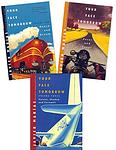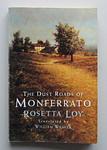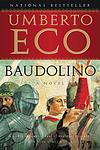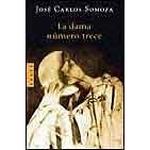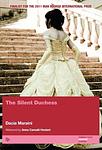The Greatest Italian, Spanish "Fiction" Books Since 1980
Click to learn how this list is calculated.
This list represents a comprehensive and trusted collection of the greatest books. Developed through a specialized algorithm, it brings together 300 'best of' book lists to form a definitive guide to the world's most acclaimed books. For those interested in how these books are chosen, additional details can be found on the rankings page.
Genres
Countries
Date Range
Reading Statistics
Click the button below to see how many of these books you've read!
Download
If you're interested in downloading this list as a CSV file for use in a spreadsheet application, you can easily do so by clicking the button below. Please note that to ensure a manageable file size and faster download, the CSV will include details for only the first 500 books.
Download-
1. The Name of the Rose by Umberto Eco
Set in a wealthy Italian monastery in the 14th century, the novel follows a Franciscan friar and his young apprentice as they investigate a series of mysterious deaths within the monastery. As they navigate the labyrinthine library and decipher cryptic manuscripts, they uncover a complex plot involving forbidden books, secret societies, and the Inquisition. The novel is a blend of historical fiction, mystery, and philosophical exploration, delving into themes of truth, knowledge, and the power of the written word.
-
2. Foucault's Pendulum by Umberto Eco
This novel follows three intellectual friends who work at a small publishing house. As a joke, they start inventing a conspiracy theory about a secret society that has been manipulating world events for centuries. However, as they delve deeper into their own fabrication, they begin to lose sight of what's real and what's not. Their lives take a dangerous turn when actual secret societies believe they hold the key to a universal secret and will stop at nothing to obtain it.
-
3. If Not Now, When? by Primo Levi
This novel follows a band of Jewish partisans behind German lines during World War II. They are a diverse group from different countries and social backgrounds, all brought together by the common goal of sabotaging the Nazi war effort and surviving the Holocaust. The narrative explores their various experiences, the challenges they face, their acts of resistance, and their hopes for a future free from oppression. The title reflects the urgent necessity of their mission and their determination to fight back against their persecutors.
-
4. The Shadow of the Wind by Carlos Ruiz Zafon
The novel follows the story of a young boy in post-war Barcelona, who discovers a mysterious book in a hidden library that his father takes him to, which houses forgotten books. The boy becomes captivated by the book and its author, but as he grows older, he realizes that someone is destroying all books written by this author. As he delves deeper into the mystery, the boy's life becomes intertwined with the author's, revealing a dark and tragic past that someone wants to be kept hidden. The story is a mix of romance, mystery, and a historical narrative set against the turbulent backdrop of a city recovering from war.
-
5. My Brilliant Friend by Elena Ferrante
This novel tells the story of two friends, Elena and Lila, growing up in a poor neighborhood in Naples, Italy in the 1950s. Their intense, complicated friendship is marked by competition, mutual respect, and deep affection. As they navigate the challenges of adolescence, including family drama, academic struggles, and romantic entanglements, their bond is tested and transformed. The narrative explores themes of female friendship, social class, education, and the struggle for personal autonomy in a patriarchal society.
-
6. A Heart So White by Javier Marías
The novel delves into the complexities of relationships, secrets, and communication as the protagonist, a translator and interpreter, grapples with the mysterious suicide of his father's first wife and the pervasive silence surrounding it. Through his own marriage and his observations of others', he contemplates the unsaid and the power of words, both spoken and unspoken. The narrative weaves through time and memory, exploring the impact of the past on the present and the intricate ways in which people understand and misunderstand each other.
-
7. Silk by Alessandro Baricco
"Silk" is a historical fiction novel that tells the story of a 19th-century French silkworm merchant who travels to Japan for business. During his travels, he becomes enamored with a mysterious woman. His unrequited love for her haunts him for the rest of his life, even as he returns to France and continues his life there. The novel explores themes of love, longing, and the profound impact that brief encounters can have on one's life.
-
8. The Club Dumas by Arturo Pérez-Reverte
The book follows Lucas Corso, a book detective who is hired to authenticate a rare manuscript by Alexandre Dumas. As he delves into the investigation, he finds himself entangled in a mystery involving two other books: a rare edition of "The Three Musketeers" and a satanic text, "The Book of Nine Doors of the Kingdom of Shadows". The narrative becomes a complex puzzle as Corso uncovers connections between the books, while also dealing with a seductive woman who seems to have stepped out of a Dumas novel, a mysterious killer, and a group of bibliophiles obsessed with Dumas. The lines between fiction and reality blur as he gets closer to the truth.
-
9. Bartleby & Co by Enrique Vila-Matas
"Bartleby & Co" is a metafictional work that explores the theme of "writers of the No," authors who cease to write or never start at all. The narrator, an office worker on sick leave, uses footnotes to a nonexistent text to delve into the stories of these authors, including famous real-life figures. The book serves as a meditation on silence, refusal, and the nature of literature itself.
-
10. Your Face Tomorrow: Fever and Spear by Javier Marías
The novel explores the life of a Spanish expatriate in England who is recruited by a secretive organization due to his unique ability to interpret people's behavior. As he becomes entangled in a world of espionage, he grapples with moral and ethical dilemmas, questioning the validity of his work and the consequences of his actions. Through a blend of introspective musings and suspenseful narrative, the protagonist's life unravels, revealing a complex web of deceit, betrayal, and violence.
-
11. Larva: Midsummer Night's Babel by Julián Ríos
"Larva: Midsummer Night's Babel" is a complex and innovative novel that explores the nature of language and the power of words. It's a narrative labyrinth that follows a group of characters through the streets of London on a midsummer night, as they engage in a series of intellectual debates and discussions. The story is filled with puns, word games, and literary references, and is written in a unique style that blends poetry and prose. The novel is also a satire of the literary world, with the characters often critiquing and parodying various literary styles and authors.
-
12. The Neapolitan Novels by Elena Ferrante
"The Neapolitan Novels" is a four-part series that explores the intricate and lifelong friendship between two women from Naples, Italy. The series spans several decades, beginning in the 1950s, and provides a detailed examination of the women's lives, struggles, and the societal pressures they face. The narrative delves into themes of identity, friendship, love, violence, and socio-political changes in post-war Italy. The series is known for its rich character development and vivid portrayal of female friendship.
-
13. Obabakoak by Bernardo Atxaga
Obabakoak is a collection of interconnected stories that revolve around the inhabitants of a fictional Basque village named Obaba. The stories, which are a blend of the magical and the everyday, explore the complexities of human nature, as well as the rich history and culture of the Basque region. Themes of love, fear, tradition, and change are woven throughout, offering a nuanced and evocative portrait of a community and its people.
-
14. All Souls by Javier Marías
"All Souls" is a novel that follows the experiences of a Spanish professor teaching at Oxford University. His life is filled with eccentric colleagues, a puzzling love affair, and a mysterious sense of intrigue. As the protagonist navigates through the academic world, he becomes entangled in a web of personal relationships and bureaucratic intricacies. The book is a blend of romance, suspense, and satire, with a poignant exploration of memory, longing, and the ephemeral nature of human relationships.
-
15. Troubling Love by Elena Ferrante
This novel follows a woman who returns to Naples after her mother's mysterious death, determined to understand the enigmatic life her mother led. As she delves into her mother's past, she uncovers a web of secrets and discovers more about her own identity in the process. The narrative explores themes of mother-daughter relationships, identity, and the power of the past.
-
16. Pereira Maintains by Antonio Tabucchi
"Pereira Maintains" is a novel set in the backdrop of 1938 Portugal during the fascist dictatorship of Antonio de Oliveira Salazar. The narrative follows Pereira, a widowed, overweight editor of the culture section of a second-rate Lisbon newspaper, who becomes politically awakened after meeting a young anti-fascist. As he grapples with his conscience, he risks everything to help his new friend and his pregnant girlfriend escape to safety. The story is a compelling exploration of the struggle for moral integrity in a climate of political oppression.
-
17. A Light Comedy by Eduardo Mendoza
"A Light Comedy" is a humorous tale set in Barcelona during the 1940s, centered around a middle-aged woman who, after losing everything in the Civil War, uses her wits and cunning to survive. She turns her apartment into a boarding house for single ladies, but when the business starts to falter, she decides to concoct a plan to marry a rich American. The novel is filled with a colorful cast of characters, and is a satirical commentary on the social and political climate of the time.
-
18. The Heretic by Miguel Delibes
"The Heretic" is a historical novel set during the Spanish Inquisition. It follows the life of a man born in 16th century Spain, who, despite being raised in a strictly Catholic environment, begins to question the teachings and practices of the Church. As he grows older, he becomes involved in the Protestant Reformation, risking his life in a society where heresy is punishable by death. This book explores themes of faith, religious persecution, and the struggle for freedom of thought.
-
19. I'm Not Scared by Niccolò Ammaniti
Set in a small Italian village during the scorching summer of 1978, this novel tells the story of a 9-year-old boy who discovers a horrific crime being hidden by the adults in his community. The boy, while exploring an abandoned farmhouse, stumbles upon a young boy being held captive in a hole. As he tries to help the captive boy, he is forced to face the moral complexities of his world and the terrifying realization that his own father might be involved in this cruel act. The story is a poignant exploration of innocence, friendship and the loss thereof, and the harsh realities of adulthood.
-
20. Soldiers of Salamis by Javier Cercas
This novel revolves around a true event during the Spanish Civil War, where a nationalist soldier spares the life of a famous poet who was about to be executed. The story is told from the perspective of a journalist who becomes obsessed with the incident and embarks on a quest to uncover the truth about what happened. As he delves deeper, he discovers the complexities of heroism, history, and memory, and is forced to question his own understanding of these concepts.
-
21. The Dust Roads Of Monferrato by Rosetta Loy
Set against the backdrop of rural Italy, the novel weaves a rich tapestry of family saga and historical transformation. It follows the lives of several generations of a family in the Monferrato region, as they navigate the tumultuous changes of the 20th century. Through wars, social upheaval, and personal trials, the characters' stories intertwine with the dusty roads of their homeland, painting a vivid portrait of a community bound by tradition yet facing the inevitable march of progress. The narrative delves into themes of memory, identity, and the enduring impact of the past on the present, all while celebrating the beauty and resilience of the Italian countryside.
-
22. Baudolino by Umberto Eco
Set in the 12th century, the novel follows Baudolino, a self-proclaimed liar and adventurer, as he travels from his home in Italy to the mythical kingdom of Prester John. Along the way, he becomes embroiled in a series of political and religious intrigues, meets a variety of fantastical creatures, and tells a series of increasingly elaborate lies. The narrative is framed as a story Baudolino is telling to a Byzantine historian, adding another layer of unreliability to his already questionable narrative.
-
23. La Dama Número Trece by José Carlos Somoza
This novel is a thrilling blend of mystery, horror, and fantasy, revolving around a struggling writer who becomes the target of a secret society known as "The Thirteen Ladies". These shadowy figures have the ability to manipulate reality through the power of words and storytelling. As he is drawn deeper into their world, he must uncover their secrets and find a way to survive their deadly games. The narrative is a rich exploration of the power of language and mythology, with a suspenseful plot that keeps readers on the edge of their seats.
-
24. The Silent Duchess by Dacia Maraini
This novel is a poignant exploration of the life of an 18th-century Sicilian noblewoman, born into privilege yet silenced by a congenital disability. Through her eyes, readers experience the constraints and expectations placed on women of her time, navigating a world where her voice is metaphorically and literally stifed. Despite the limitations imposed by her society and her own family, she embarks on a journey of self-discovery and defiance, seeking love, intellectual fulfillment, and a sense of identity within the opulent yet oppressive confines of her aristocratic life. The narrative delves into themes of power, gender, and the quest for personal freedom, painting a vivid picture of historical Sicily and the resilience of the human spirit.
-
25. Call Me By Your Name by André Aciman
The novel is a poignant exploration of desire, passion, and the confusion of young love, set during a sun-drenched summer on the Italian Riviera. It follows the blossoming romantic relationship between a precocious 17-year-old boy and a visiting 24-year-old American scholar staying at his parents' villa. As they bond over literature, music, and the languid Italian landscape, their intimacy grows, leading to a deep and transformative affair that will leave an indelible mark on their lives. The story delves into the complexities of emotions and the heartache of remembering a once-in-a-lifetime connection that both defines and haunts them.
Reading Statistics
Click the button below to see how many of these books you've read!
Download
If you're interested in downloading this list as a CSV file for use in a spreadsheet application, you can easily do so by clicking the button below. Please note that to ensure a manageable file size and faster download, the CSV will include details for only the first 500 books.
Download








